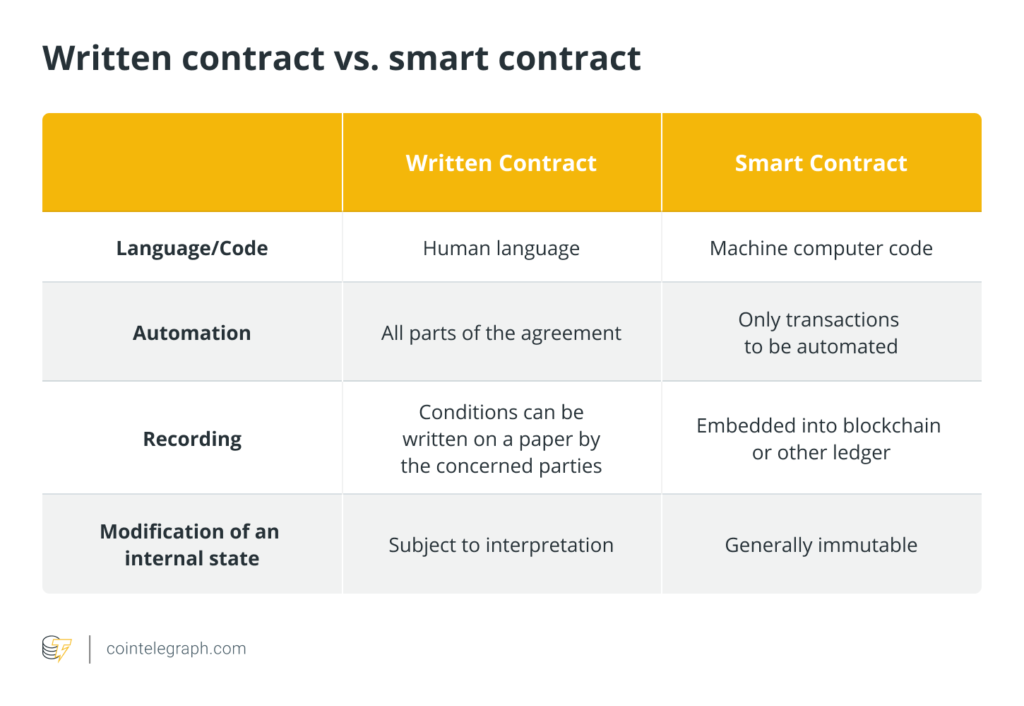When was the last time you got a late payment? Chased an invoice? Waited for your monthly paycheck only to realize it’s late yet again? You might relate to these headaches as an investor, employee or client. But the tension that affects each of these unique parties is often caused by one unwavering contributor: an underlying traditional contract.
Contracts affect every organization’s workforce, and 26% of employees are involved in managing these agreements at some point, according to the World Commerce and Contracting Association. With such a vast effect on a company’s contributors, these contracts should be up to par with the rest of a business’s advancements. Unfortunately, contracts are still typically left to human maintenance and execution by either involved party, which can lead to some pretty costly oversight and error.
Blockchain-based smart contracts can revamp businesses and stakeholder relationships but, as with most major structural changes to a company, it’s important to do them right.
Related: Hybrid smart contracts will replace the legal system
Work smarter, not harder
The current style of contracts is flawed and antiquated, but organizations have done little to change that. Poor contract management typically costs companies at least 9% of their bottom line, a consistent value leakage that can even reach a 40% loss, according to PwC. This revenue loss comes from incorrect data entry, unpaid accounts, client-management issues, incorrect reporting and discounting — essentially all caused by human error.
And the mishaps don’t stop there. Miscommunications and unmet contract terms can occur simply because an involved party is not on top of the predetermined agreements. This creates a whole slew of complications, like friction between companies and their employees or external partners that is often left to legal experts to address. A contract should provide clarity and reliability, not raise questions that require even more time and energy to address.
Companies can proactively prevent these issues from arising by bringing their contracts up to speed with the rest of their innovation. Smart contracts are stored on the blockchain and, unlike traditional contracts, are executed by the blockchain’s programming rather than by a person. So, smart contracts can enforce the terms of legal contracts automatically. This relieves either party from remembering the agreement and timelines, ensuring simplified and definite term executions.
Smart contracts don’t just mean that the contract itself is smarter, but that everyone involved is working smarter too. Without the need to manage and meet terms, people can focus on their actual jobs, making for a more efficient and productive workforce. Employees, clients, vendors, and other parties on the receiving end of a payroll don’t have to chase down a company for compensation. And people can trust unbiased code over an employer or business partner who could easily forget something or not have the other party’s best interest in mind.
Related: Smart contracts and the law: Tech developments challenge legal community
What to look out for
The fact that smart contracts can execute agreements without human action can be extremely helpful for businesses. But something that sounds too good to be true often is. That’s why companies must safely use smart contracts to enhance, rather than replace, traditional ones.

As with any contract, when there are loopholes in the agreement, either party can exploit it. Loopholes or oversights in smart contracts, which exist on a public ledger, can be exploited by an external bad actor. And we’ve seen it happen before: NFT creator Micah Johnson lost $34 million after an anonymous user exploited the smart contract during his NFT collection’s launch. While a loss of this magnitude likely won’t occur between most employers and employees, other meaningful losses can be prevented by businesses executing smart contracts through a private blockchain.

Nonetheless, the worst-case smart contract scenarios teach a valuable lesson on the importance of thoroughness when creating a smart contract. Ideally, a software engineer and a lawyer should work together to ensure the basis of the contract is sound and all necessary legal precautions have been taken.

By collaborating in the beginning stages of a smart contract’s creation, a lawyer can ensure the predetermined terms are clear, precise and agreed upon. Additionally, the lawyer can ensure the traditional contract is adequately and accurately being translated to the code of the smart contract. The software engineer can then create the code to execute the terms, mitigating risk through extensive testing to catch even minor flaws.
Smart contracts can change the way businesses handle legal agreements and execute payments, but they can also be a double-edged sword. It’s worthwhile to dedicate preliminary time to research the proper protocol, to mitigate any potential flaws, before implementing it. By doing so, companies can ensure they are modernizing the basis of their relationships and working smarter while they’re at it.
This article does not contain investment advice or recommendations. Every investment and trading move involves risk, and readers should conduct their own research when making a decision.
The views, thoughts and opinions expressed here are the author’s alone and do not necessarily reflect or represent the views and opinions of Cointelegraph.
Tudor Vrabie is a co-founder, chief technology officer, and project coordinator of SeedOn. He also co-founded HungryBytes in 2018, following his work as tech lead and PHP developer at Grapefruit. Vrabie is a software engineer, web developer, and tech enthusiast and is applying his expertise to revolutionize the crowdfunding process.


